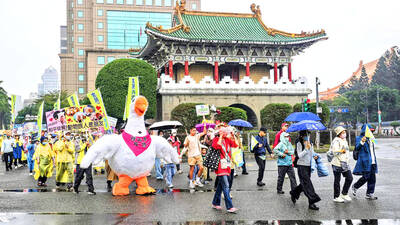Legislators yesterday proposed increasing penalties for poaching to a maximum seven-year prison sentence and declaring waters off Green Island (綠島) a no-fishing zone to protect the islands’ marine environment after the illegal taking on Saturday of an endangered species.
A rare humphead wrasse — one of seven known off the coast of Green Island — was caught by a local bed-and-breakfast owner, sparking public outrage and calls for marine conservation.
Democratic Progressive Party legislators Chen Chi-mai (陳其邁) and Yeh Yi-chin (葉宜津) called a news conference to announce they would propose draft amendments to the Wildlife Conservation Act (野生動物保育法), to increase the maximum punishment for poaching from a five-year prison sentence and NT$1 million (US$30,622) fine to a seven-year prison term and a NT$3 million fine.
They also asked the government to establish marine protected areas and conduct a census of endangered and protected species.
Chen said fish and corals are the most important resource of the tourism-dependent Green Island, but the island would lose visitors if illegal fishing and overfishing destroys its marine ecology.
Showing a photograph of himself with a humphead wrasse taken in Palau, Chen, who is an amateur diver, said Palau has a tourism dependent economy and the country attaches great importance to its marine conservation.
“Palau estimates that a single devil fish can generate about US$1 million in tourism, but Taiwanese fishermen sell the fish for NT$50 per 600g,” Yeh said.
“Taiwan does not have an ocean culture or a tourism culture. What we have is a seafood culture,” Yeh added.
While Taiwan’s neighbors have endeavored to preserve marine resources and build a tourism industry that can create US$400 per diver per day, Taiwan is still trying to attract Chinese tourists with seafood that can generate only US$70 per visitor per day, Yeh said.
Yeh said that she would call on the Tourism Bureau to make Green Island a no-fishing zone.

NUMBERS IMBALANCE: More than 4 million Taiwanese have visited China this year, while only about half a million Chinese have visited here Beijing has yet to respond to Taiwan’s requests for negotiation over matters related to the recovery of cross-strait tourism, the Tourism Administration said yesterday. Taiwan’s tourism authority issued the statement after Chinese-language daily the China Times reported yesterday that the government’s policy of banning group tours to China does not stop Taiwanese from visiting the country. As of October, more than 4.2 million had traveled to China this year, exceeding last year. Beijing estimated the number of Taiwanese tourists in China could reach 4.5 million this year. By contrast, only 500,000 Chinese tourists are expected in Taiwan, the report said. The report

Temperatures are forecast to drop steadily as a continental cold air mass moves across Taiwan, with some areas also likely to see heavy rainfall, the Central Weather Administration (CWA) said. From today through early tomorrow, a cold air mass would keep temperatures low across central and northern Taiwan, and the eastern half of Taiwan proper, with isolated brief showers forecast along Keelung’s north coast, Taipei and New Taipei City’s mountainous areas and eastern Taiwan, it said. Lows of 11°C to 15°C are forecast in central and northern Taiwan, Yilan County, and the outlying Kinmen and Lienchiang (Matsu) counties, and 14°C to 17°C

STEERING FAILURE: The first boat of its class is experiencing teething issues as it readies for acceptance by the navy, according to a recent story about rudder failure The Hai Kun (海鯤), the nation’s first locally built submarine, allegedly suffered a total failure of stern hydraulic systems during the second round of sea acceptance trials on June 26, and sailors were forced to manually operate the X-rudder to turn the submarine and return to port, news Web site Mirror Daily reported yesterday. The report said that tugboats following the Hai Kun assisted the submarine in avoiding collisions with other ships due to the X-rudder malfunctioning. At the time of the report, the submarine had completed its trials and was scheduled to begin diving and surfacing tests in shallow areas. The X-rudder,

DEMAND: The government should enact regulations in line with Austria and Germany to incorporate vegan nutrition into school meals, an advocate said More than 1,000 people yesterday marched in Taipei to promote veganism, calling for legislation to incorporate vegan diets into school lunches and the national net zero emissions program. Participants gathered on Ketagalan Boulevard in front of the Presidential Office Building for the march, which was organized by the Vegan Action Network (VAN). Former ambassador to Chad Chiu Chung-jen (邱仲仁), actor Yankee Yang (楊子儀) and actress Cindy Lien (連俞涵) attended the event. VAN member Marianne Chao (趙梅君) said that the campaign aimed to urge the government to promote vegan diets across schools and government agencies via legislation and national policies, which would help build